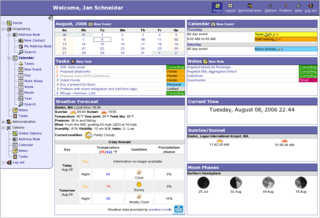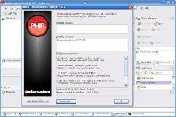
Kent Beck is an American software engineer and the creator of extreme programming, a software development methodology that eschews rigid formal specification for a collaborative and iterative design process. Beck was one of the 17 original signatories of the Agile Manifesto, the founding document for agile software development. Extreme and Agile methods are closely associated with Test-Driven Development (TDD), of which Beck is perhaps the leading proponent.

Adobe Flash is a multimedia software platform used for production of animations, rich internet applications, desktop applications, mobile apps, mobile games, and embedded web browser video players.
Visual Basic for Applications (VBA) is an implementation of Microsoft's event-driven programming language Visual Basic 6.0 built into most desktop Microsoft Office applications. Although based on pre-.NET Visual Basic, which is no longer supported or updated by Microsoft, the VBA implementation in Office continues to be updated to support new Office features. VBA is used for professional and end-user development due to its perceived ease-of-use, Office's vast installed userbase, and extensive legacy in business.
A computing platform or digital platform or software platform is an environment in which a piece of software is executed. It may be the hardware or the operating system (OS), even a web browser and associated application programming interfaces, or other underlying software, as long as the program code is executed with it. Computing platforms have different abstraction levels, including a computer architecture, an OS, or runtime libraries. A computing platform is the stage on which computer programs can run.
In software engineering, a software design pattern is a general, reusable solution to a commonly occurring problem within a given context in software design. It is not a finished design that can be transformed directly into source or machine code. Rather, it is a description or template for how to solve a problem that can be used in many different situations. Design patterns are formalized best practices that the programmer can use to solve common problems when designing an application or system.
A software development kit (SDK) is a collection of software development tools in one installable package. They facilitate the creation of applications by having a compiler, debugger and sometimes a software framework. They are normally specific to a hardware platform and operating system combination. To create applications with advanced functionalities such as advertisements, push notifications, etc; most application software developers use specific software development kits.

A web application is application software that is accessed using a web browser. Web applications are delivered on the World Wide Web to users with an active network connection.
Software bloat is a process whereby successive versions of a computer program become perceptibly slower, use more memory, disk space or processing power, or have higher hardware requirements than the previous version, while making only dubious user-perceptible improvements or suffering from feature creep. The term is not applied consistently; it is often used as a pejorative by end users (bloatware) to describe undesired user interface changes even if those changes had little or no effect on the hardware requirements. In long-lived software, perceived bloat can occur from the software servicing a large, diverse marketplace with many differing requirements. Most end users will feel they only need some limited subset of the available functions, and will regard the others as unnecessary bloat, even if end users with different requirements require those functions.
In computer programming, a software framework is an abstraction in which software, providing generic functionality, can be selectively changed by additional user-written code, thus providing application-specific software. It provides a standard way to build and deploy applications and is a universal, reusable software environment that provides particular functionality as part of a larger software platform to facilitate the development of software applications, products and solutions.
Kaneva, LLC is a privately owned American video game company based in Atlanta, Georgia and founded in 2004 by Christopher Klaus and Greg Frame. Kaneva was a 3D Virtual World that supported 2D web browsing, social networking and shared media.

RadPHP was an IDE and rapid application development framework for the PHP programming language developed by Embarcadero Technologies.
The Facebook Platform is the set of services, tools, and products provided by the social networking service Facebook for third-party developers to create their own applications and services that access data in Facebook.
In mass communication, media are the communication outlets or tools used to store and deliver information or data. The term refers to components of the mass media communications industry, such as print media, publishing, the news media, photography, cinema, broadcasting, digital media, and advertising.

SproutCore is an open-source JavaScript web framework. Its goal is to allow developers to create web applications with advanced capabilities and a user experience comparable to that of desktop applications. When developing a SproutCore application, all code is written in JavaScript. A notable fork of SproutCore is Ember.js. Both projects are maintained separately and have taken different directions.
Heroku is a cloud platform as a service (PaaS) supporting several programming languages. One of the first cloud platforms, Heroku has been in development since June 2007, when it supported only the Ruby programming language, but now supports Java, Node.js, Scala, Clojure, Python, PHP, and Go. For this reason, Heroku is said to be a polyglot platform as it has features for a developer to build, run and scale applications in a similar manner across most languages. Heroku was acquired by Salesforce in 2010 for $212 million.
A software widget is a relatively simple and easy-to-use software application or component made for one or more different software platforms.
Urban homesteading can refer to several different things: programs by local, state, and federal agencies in the USA who work to help get people into city homes, squatting, practicing urban agriculture, or practicing sustainable living techniques.

A database application is a computer program whose primary purpose is retrieving information from a computerized database. From here, information can be inserted, modified or deleted which is subsequently conveyed back into the database. Early examples of database applications were accounting systems and airline reservations systems, such as SABRE, developed starting in 1957.
A webhook in web development is a method of augmenting or altering the behavior of a web page or web application with custom callbacks. These callbacks may be maintained, modified, and managed by third-party users and developers who may not necessarily be affiliated with the originating website or application. The term "webhook" was coined by Jeff Lindsay in 2007 from the computer programming term hook.
FlatBuffers is a free software library implementing a serialization format similar to Protocol Buffers, Thrift, Apache Avro, SBE, and Cap'n Proto, primarily written by Wouter van Oortmerssen and open-sourced by Google. It supports “zero-copy” deserialization, so that accessing the serialized data does not require first copying it into a separate part of memory. This makes accessing data in these formats much faster than data in formats requiring more extensive processing, such as JSON, CSV, and in many cases Protocol Buffers. Compared to other serialization formats however, the handling of FlatBuffers requires usually more code, and some operations are not possible.




